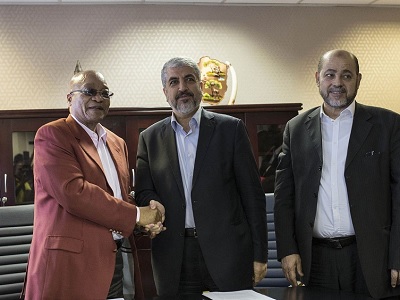
By Daud Abdullah
Whatever political and practical weaknesses it may have, there are some things that will remain forever constant within the African National Congress (ANC). Opposition to apartheid is one of them. It was, therefore, quite natural that South Africa’s ruling party should host leaders of the Palestinian Islamic Resistance Movement (Hamas) last week.
For the ANC, and indeed the South African people who fought against apartheid rule, the Palestine issue is unfinished business. Having suffered loss of territory, state repression, colonial rule and racism of the most virulent kind, they are driven instinctively to support the Palestinian people in their own “long walk to freedom”.
As it turned out, the visit by the Hamas delegation led by Khaled Meshaal took many by surprise. There were no prior public statements about it from either the ANC or the Palestinians. Both were clearly conscious of the fact that, in 1998, the founder of Hamas, Shaikh Ahmed Yassin, cancelled a visit to South Africa after it was publicised ahead of schedule. The wheelchair-bound shaikh was assassinated by Israel in 2004.
Two things can be said about Meshaal’s visit. As far as Hamas is concerned, it underscored the movement’s determination, and ability, to overcome attempts to isolate it diplomatically. For the ANC, it demonstrated an unwillingness by the party to relinquish the long-standing principle championed by former ANC leader and President of South Africa Nelson Mandela: “No one chooses our friends for us.” Mandela, of course, was long denounced as a “terrorist” by Israel’s most devoted friends and allies.
Furthermore, the visit points to a growing recognition in the Global South that apartheid in Palestine, as in South Africa, will not be defeated because of the support of western governments but in spite of their subservience to Israel.
Look at US State Department spokesman Admiral John Kirby, for example. Last week, he infuriated Israeli officials when he suggested that Israel was partially responsible for the current unrest. When asked at a press briefing if it was the view of the US administration that the status quo in Al Aqsa Mosque has been changed he replied, “Well, certainly, the status quo has not been observed, which has led to a lot of the violence.”
Shortly thereafter he tweeted a “clarification” about the briefing. “I did not intend to suggest that the status quo at Temple Mount/Haram Al Sharif has been broken.”
If there was a need for an explanation of this sudden about turn, it was found in the subtitle of a report published by the Israeli daily Haaretz. “US Department of State Spokesman John Kirby has been forced to retract a comment he made on Wednesday that Israel had violated the status quo on the Temple Mount in Jerusalem.” (Emphasis added.)
With such fickle interlocutors, Palestinians will have to wait until the cows come home before they have a state with Jerusalem as its capital. Thankfully though, they have in the ANC a natural ally prepared to go the extra mile, beyond the customary protocols and photo-opportunities that mark official visits. Hence, one of the outcomes of last week’s visit was an agreement for Hamas to open an office in Pretoria.
There was, of course, outrage in Israel and even some Arab capitals. Yet by refusing to apologise, as the US does regularly, South Africa has spoken not just for the African continent but also the whole Global South.
Two decades ago, many African countries welcomed the Oslo Accords after they were signed in Washington. They ended their diplomatic boycott of Israel, thinking that the agreement would usher-in an end to the Zionist colonial enterprise in Palestine. Regrettably, even after the Palestinians had agreed to a state on just 22 per cent of their historic homeland, Israel to this day refuses to withdraw from the territory that it captured in 1967 and continues to colonise under the protection of its brutal military occupation.
Though not the only reason, this question of the occupation and settlement expansion must have forced many in Africa to change their position. In South Africa, every time a Palestinian child is killed, whether in his father’s arms like Muhammad Durra or burnt alive in his home, like Ali Dawabsheh, South Africans remember Hector Pieterson and the other victims of the 1976 Soweto Uprising. Such inhumanity, they believe, must never happen again, anywhere.
There is clearly much common experience in their individual histories that solidifies the collaboration between the ANC and Hamas. They have both been reviled and blacklisted as “terrorists” by the apologists for apartheid. They both paid a heavy price with lengthy prison sentences and the assassination of their leaders.
Ultimately, the defeat of apartheid in South Africa has left a legacy as well as a permanent responsibility. The leadership of the ANC must be saluted for taking up the challenge to defeat apartheid wherever it exists, especially in Palestine.
When they finally open their office in Pretoria, Hamas officials must hit the ground running. They will find in the South Africans a people who are highly politicised and driven by a love of freedom and justice. As such, they must take maximum advantage of this opportunity to regain support for their cause not only in South Africa but also in every corner of the free world.
– Dr. Daud Abdullah is the director of the Middle East Monitor (MEMO) in London. (This article was first published in Middle East Monitor.)





